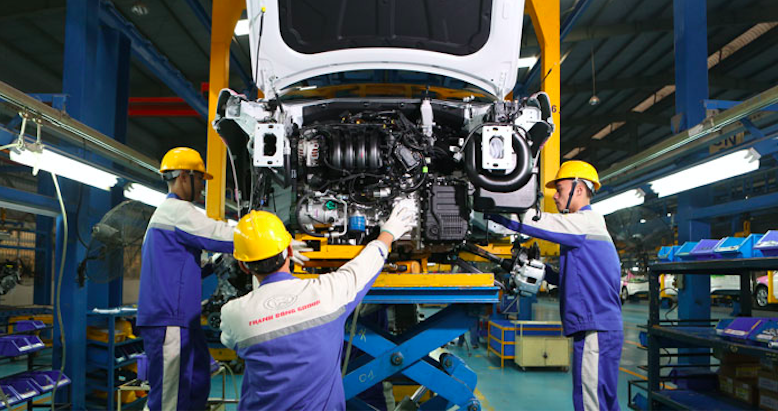Vietnam Fin Min rules out extending supporting program for domestic cars
A 50% reduction in the registration fee for domestically-produced cars is seen as discriminatory treatment against imported ones.
Vietnam's Ministry of Finance (MoF) has advised the government to not consider extending the 50% reduction in the registration fee for domestically-produced cars beyond its current validity which expires this year-end.
| Cars production at Huyndai Thanh Cong. Photo: Hoang Giang. |
Prime Minister Nguyen Xuan Phuc in May agreed to slash the registration fee, which accounts for up to 12% of the car price, helping customers save thousands of dollars and boosting sales of domestic cars.
The MoF estimated state budget revenue would be reduced by VND3.7 trillion (US$160.2 million) as a result of the move.
According to the MoF, a cut in the registration fee for domestic cars is seen as a short-term solution to support local cars manufacturers and assemblers who are severely affected by the Covid-19 pandemic.
However, during the implementation process, embassies of some countries, including Thailand, Indonesia, and the European Chamber of Commerce (EuroCham), expressed concern that such a reduction shows discriminatory treatment against imported cars.
Under the current legislation, registration fees for passenger cars, or cars with less than nine seats, in eight provinces and cities (Hanoi, Quang Ninh, Hai Phong, Lao Cai, Cao Bang, Lang Son, Son La, and Can Tho) are 12% of the car price, while the rate is 11% in Ha Tinh, and 10% in Ho Chi Minh City, Danang and elsewhere.
For a pickup truck, the fee is at 7.2% for the group of the above-mentioned eight cities and provinces, 6.6% for Ha Tinh, and 6% for other localities.
In case of a Toyota Fortuner with a price tag of VND1.35 billion (US$57,820), a customer would have to pay a registration fee of VND162.4 million (US$6,955), but now the amount is cut by 50% to VND81.2 million (US$3,478) if the car is made in Vietnam.
Car sales in Vietnam in the January–October period dropped 18% year-on-year to 212,409 units across all segments, according to a monthly report from the Vietnam Automobile Manufacturers Association (VAMA). Upon breaking down, sales of domestically assembled cars reached 134,797 units during the period, down 12% compared to the same period of last year, while imported completely-built-units (CBUs) totaled 77,612 units, down 26%.
Car making is considered a key industry in Vietnam, accounting for approximately 3% of national GDP. However, the industry has severely been impacted by the Covid-19 pandemic. Viet Dragon Securities Company predicted a decline of 15% made-in-Vietnam cars in sales volume this year.













